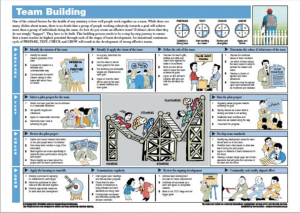Liverpool Football Club (American soccer) is one of the biggest clubs in the world. One of the main reasons for this achievement is the coach, Jurgen Klopp. He surrounds himself with excellent people who are experts in the essentials of team recruitment, development, and strategy to compete at the highest levels in world football.
5 Qualities of Healthy Teams

1. Passion for the vision
The goal for Liverpool is clear–win every game and every competition they play. Every player on the team is actively working toward that goal motivated by a passion to be the best. Translating ministry vision into goals, objectives, and even passion is a little trickier. Passion to be the best doesn’t work here. The truth is ministry is deeply personal. In order for teams to work effectively in ministry, each member has to at least share a common vision that is rooted in seeing people transformed by the love of God.
- How does each member describe the vision of your team?
- What are some ways that you can help build better alignment in vision, goals, and objectives?
2. Shared values
Jurgen Klopp is a Jesus follower and requires a certain quality of player on his team. Though all the members of his team may not be Christian, many of the attributes he looks for in players parallel those of a Christian. When any team is committed to living out . respect, honesty, integrity, humility, and industriousness (for example) they become people who live above reproach.
- What values do you look for in your team members?
- How can you work to appropriately instill those values in others?
3. Ability
Liverpool players have world-class skills and technique to compete at the highest levels. Ministries tend to collect people who play Forward, ignoring the need for Full-backs, Center-backs, Midfielders, and a Goalkeeper. If your church is made up of a bunch of guys fighting for the ball and the limelight, take some time to meditate on the description of the Body of Christ in 1 Corinthians 12 and the variety of spiritual gifts God bestows in Romans 12. Ministry needs a variety of people.
- What skills do your team members need?
- What skills do your team members possess?
- What areas must be developed?
4. Emotional Intelligence
Liverpool demand that players be self-aware both on and off the field or they simply do not remain in the club for long. Ministry is hard. People seem to either cozy up to leaders or they don’t speak up unless it’s to complain. For long-term health and effectiveness, people need to see themselves and others clearly and be able to process their emotions in a healthy way.
- Where do your team members need to grow in their EQ?
- How can you support emotional growth and stability in your team?
5. Disciple of Christ
Okay, this one isn’t directly related to team sports but it is absolutely essential for ministry. Every member of your team should be growing as a disciple of Christ. They should be able to answer “In what ways is God currently asking you to grow?”
- Are your team members moving towards Christ or away from Him?
- What are some ideas to bring freshness to your team disciple making culture e.g. bible study and worship?
How to coach a leader to build a healthy, reproducible team
In Doing Church as a Team, Wayne Cordeiro explains how he tapped into and applied fractals when developing healthy, reproducible volunteer teams. The idea goes like this. Each team identifies the 4 key areas of their ministry and assigns a person to each. For most ministries the four areas that are essential for a team to thrive include: visionary leader, logistics, care and communication. With these four areas now find the people who are most gifted in each to work together. Here are some questions that you can use to coach a team through the process:
- What are the four key areas that will help your team thrive and reproduce?
- How does each area contribute to the health and reproduction of the team?
- What gifts are most applicable to each?
- Who are the gifted and most passionate people to serve in those roles?
- What is the best way to invite people into each area?
Once you help your client identify names in each quadrant of the fractal the momentum from the exercise is enough to move them forward and take action. Fractals create synergy that is lasting, clarity around what is needed for the team to thrive, and motivation to move forward. In other words, effective volunteer teams.
Coaching resources to coach leaders on building effective volunteer teams
Cover Photo by Brooke Cagle on Unsplash




